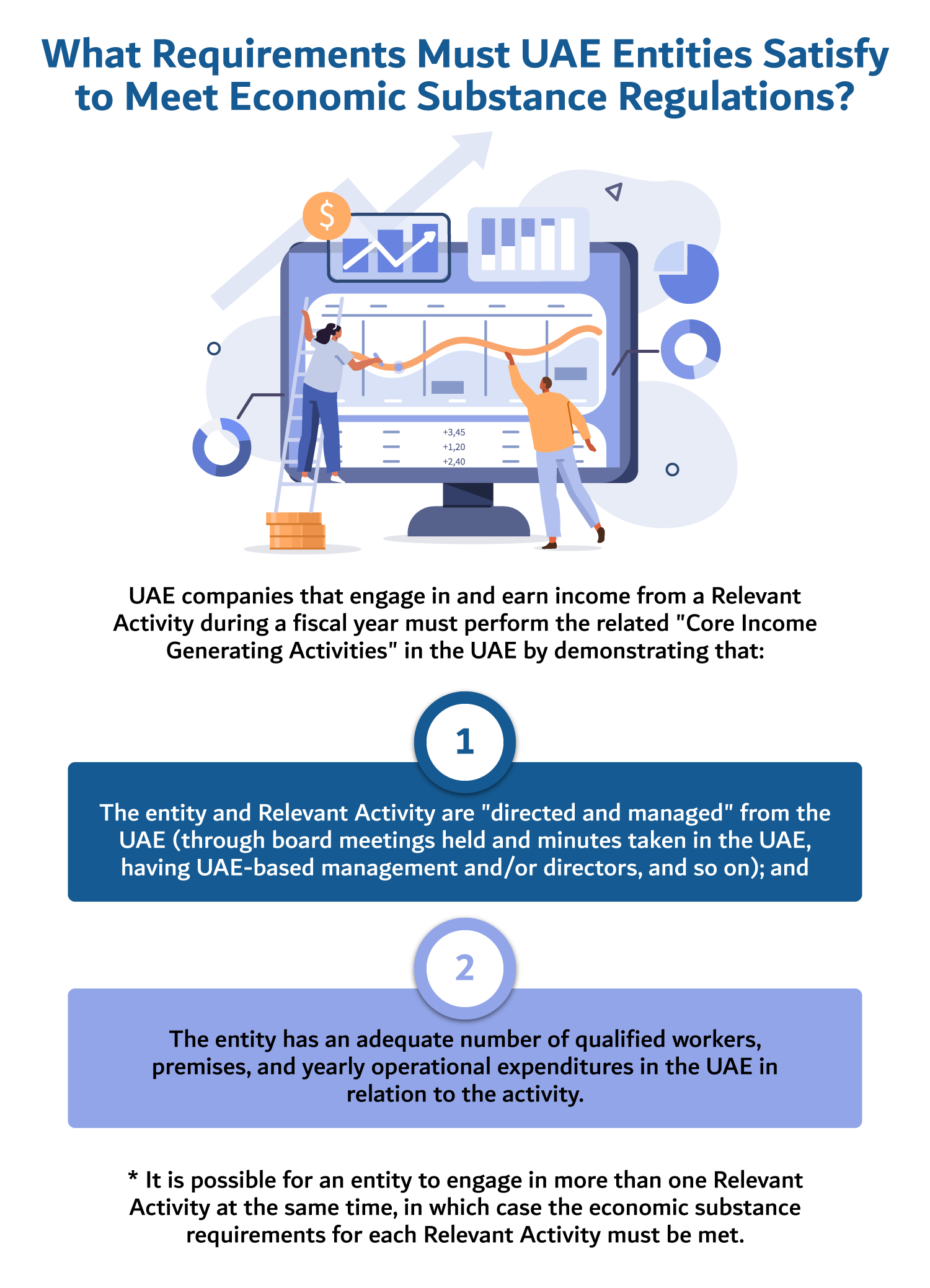The new economic substance regulations (ESR) aim to stop non-domiciled directors who have registered (and who operate) companies in the UAE from evading tax in their home country. It’s an important step by the UAE to ensure the country is not blacklisted as ‘non-cooperative’ by the EU. In turn, it creates a better and fairer business environment.
Regardless of how you’re setting up your business, it’s important that you’re aware of the UAE’s economic substance regulations. Essentially, your company needs to be managed or directed within the UAE, have an adequate number of UAE-based staff (who are full-time), generate the majority of your income in the UAE, as well as keep adequate assets in the UAE and be able to demonstrate operating expenditure in the country.
What is ESR UAE?
If this all feels a little overwhelming, we’ll break down what you need to know ahead of time in this article. In simple terms, ESR is defined as a set of standards that requires companies in the UAE to carry out business activities substantially in the country of their jurisdiction. The sole purpose of ESR would be to discard businesses with underlying intentions of registering their business to enjoy tax and economic benefits. In a country like Dubai, with highly favourable tax concession treatment, it’s logical that entities should establish stricter requirements to ensure sustainability in income generation.
The key industries to which ESR applies to include: shipping, fund management, insurance, banking, lease financing, distribution and service centres, holding companies, company headquarters, and intellectual property businesses. This is not an exhaustive list, so it’s important to do your research to ensure whether you need to take action. It’s worth talking to the experts on this point to ensure you remain compliant. There can be fines of up to AED 300,000, so it is critical to get the best advice.

Manage Your Business from Within the UAE
With the new economic substance regulations, your managing director (or one of your company’s senior management) has to be based in the UAE. That essentially means they operate from the UAE full-time, and it must be within the specific activity in which the company has been set up. The size of your business does not affect this requirement.
If your company has a board of directors, you must be able to show that there have been UAE-based meetings and that minutes have been taken from these meetings.
Employ Full-Time Staff in the UAE
In addition to requirements for management, you must ensure that your employees are physically present in the UAE. (This doesn’t apply to outsourcing.)
Ensure Your Main Income is Generated Within the UAE
The work that your company does must be conducted from within the UAE. It’s acceptable if your clients are out of the country, but your key place of work should be the UAE.
Own Assets and Spend on Local Business Services
Your company needs to be spending an adequate amount of operating expenditure in the UAE. As with many of the regulations, it’s hard to gauge exactly how much or to put an exact figure.
When it comes to ownership of assets, it’s also a little unclear, but likely that assets will need to be declared.
It’s true that ensuring you comply with these regulations does take some thought and some work. It’s part of the UAE’s ensuring that it continues to be a global hub for business, attracting the most prestigious companies from around the world and being fertile ground for entrepreneurs.
Government Announcement
We have talked about the situation in terms of what it means for your company. Let’s end by looking at the government’s official announcement that brought these regulations into effect, outlining, as it does, how it responds to actions by the European Union:
As part of the UAE’s commitment as a member of the OECD Inclusive Framework, and in response to an assessment of the UAE’s tax framework by the European Union Code of Conduct Group on Business Taxation, the UAE issued Economic Substance Regulations (Cabinet of Ministers Resolution No. 31 of 2019), (the “Regulations”) on 30 April 2019. Guidance on the application of the Regulations was issued on 11 September 2019 (Ministerial Decision No. 215 of 2019), and Cabinet Decision No. 58/2019 on the Determination of Regulatory Competencies lists the Regulatory Authorities tasked with the administration and enforcement of the Regulations. Amendments to the Regulations were made by Cabinet of Ministers Resolution No. (57) of 2020 on 10 August 2020, and updated Guidance was issued on 19 August 2020 Ministerial Decision No. (100) of 2020. The Regulations require UAE onshore and free zone companies and certain other business forms that carry out any of the defined “Relevant Activities” listed below to maintain and demonstrate an adequate “economic presence” in the UAE relative to the activities they undertake (“Economic Substance Test”).
Your Free Zone Options
Now is the time to take your business to a new level at Meydan Free Zone, an economic district that boasts one of the most prestigious addresses in the country, close to the key commercial and financial hubs of Dubai.
With a great mixture of investment and lifestyle benefits, you can live and work in Meydan’s premium mixed-use developments – offering high-quality office spaces and elegant lifestyle communities.
And it couldn’t be easier to get started. All your individual business needs can be met with a smooth registration process, tailored packages, and assistance on-hand.
Isn’t it time you started your new business journey with Meydan Free Zone?
FAQ 1: What are Economic Substance Regulations in UAE?
ESR is a set of regulations directed at maintaining economic substance by requiring UAE onshore and free zone companies to carry out certain ‘defined’ business activities which help establish a considerable economic presence in the UAE. This also plays a part in making sure that companies aren’t subjected to any tax evasion mechanisms.
FAQ 2: Who has to file ESR in the UAE?
Local companies in the UAE, whether they are located in free zones or onshore, and any resident business entity are required to file for ESR.
FAQ 3: Is ESR filing mandatory?
Filing for ESR would be mandatory if the business generates income or revenue from the Relevant activity under ESR regulations. There is no room for claiming an exemption if the business directly falls under a certain activity.
FAQ 4: What is ESR in compliance?
Any business structure that carries out listed Relevant activities are required to perform an Economic Substance Test as they generate a substantial amount of income from the listed business activities.

